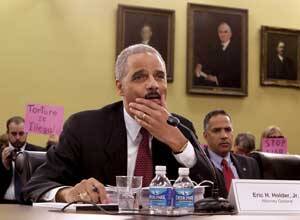Why are so many so afraid of the truth? The proposal of Senator Patrick J. Leahy, Democrat of Vermont, for a nonpartisan truth commission to investigate possible crimes committed in connection with the Central Intelligence Agency’s interrogation of detainees has sparked resistance from President Obama and a wide range of Republicans, all of whom urge us to look forward, not backward. But in the face of credible evidence that high-level Bush administration officials authorized torture, a crime against humanity, the least we should do is undertake a serious, independent investigation. Accountability is the touchstone of the rule of law. We owe it to the victims, the world and ourselves to hold the wrongdoers accountable. Moreover, without an official acknowledgment of wrongdoing, we risk repetition of the abuses of the past.
We know already that U.S. officials up to and including Vice President Dick Cheney authorized waterboarding. We also know that lawyers in the Justice Department’s Office of Legal Counsel, including Jay Bybee, John Yoo, Daniel Levin and Stephen Bradbury, wrote memoranda that gave a green light to the practice by arguing that waterboarding does not constitute torture, or even cruel, inhuman or degrading treatment. President Obama, Attorney General Eric Holder, and C.I.A. Director Leon Panetta have all since conceded what the world already knew—that waterboarding is in fact torture.
As a legal matter, the United States is compelled by the U.N. Convention Against Torture, a binding treaty that we ratified in 1988, to “submit the case to competent authorities for the purpose of prosecution.” Those authorities “shall take their decision in the same manner as in the case of any ordinary offence of a serious nature.” At a minimum, then, Attorney General Holder must investigate and make a decision as to whether to prosecute.
Vague Standards Defining Torture
A prosecution of Vice President Cheney or, for that matter, the Justice Department lawyers would be deeply divisive, but that is no justification for declining to prosecute. The attorney general could decide, however, that a prosecution is not warranted on the grounds that there is not proof beyond a reasonable doubt that anyone knowingly authorized torture. The cabinet officials who gave the go-ahead, and the C.I.A. agents who carried out the interrogations will claim that they relied on opinions from the Justice Department and concluded that these tactics did not rise to the level of torture. And the lawyers will argue that they sought only to identify the line between torture and abuse short of torture. Given the vague standards used to define torture, this was no simple task. My own view is that when the Justice Department memos are read carefully, they show that the lawyers contorted the law to facilitate brutality, instead of requiring the C.I.A. to conform its practices to the law. But without more evidence, a prosecutor might reasonably conclude that such a case cannot be proven beyond a reasonable doubt, as the criminal law requires.
A criminal prosecution, however, is not the only way to achieve accountability. It took more than 40 years to do so, but in 1988 Congress officially apologized for the wrong of interning 120,000 Japanese and Japanese-Americans during World War II, and paid reparations to the survivors. After a Canadian citizen, Maher Arar, was rendered to Syria for torture by U.S. authorities acting on information provided by Canada, Canada conducted an official inquiry, resulting in a 1,100-page report that exonerated Arar and castigated Canadian authorities. Canada’s Parliament unanimously apologized to Arar, and the government paid him $8.7 million in damages. These forms of accountability, while not criminal, nonetheless help create a bulwark against repetition of the wrongs.
Whether or not a criminal case proceeds, as a country we have a moral obligation to investigate and acknowledge illegal abuses committed in our name. That process would be best advanced by a blue-ribbon commission that could rise above partisan politics, assemble all the facts and issue an official report addressing the question of whether the practices employed by the C.I.A. were not only a bad idea, but illegal as well.
Some complain that a truth commission is not enough. Crimes require criminal prosecutions, but empaneling a commission does not foreclose that possibility. Depending on what the evidence shows, prosecution may be the appropriate response in the long run. For the moment, however, that conclusion is not yet obvious. It may have been wrong, but not criminally wrong, to rely on flawed legal advice from the Justice Department that waterboarding was not torture. The legal advice itself may have been morally repugnant and professionally incompetent without necessarily being criminal. Only further investigation can tell whether criminal prosecution is warranted. But a truth commission would be an important first step toward both restoring the rule of law in the United States and restoring the United States to its place as a law-abiding member of the community of nations.









CCC #1791 This ignorance can often be imputed to personal responsibility. This is the case when a man "takes little trouble to find out what is true and good, or when conscience is by degrees almost blinded through the habit of committing sin." In such cases, the person is culpable for the evil he commits.
Is there a legal equivelant to this? If so, a truth commission could help to determine if those who authorized and committed the "enhanced interrogation" are guilty of that.